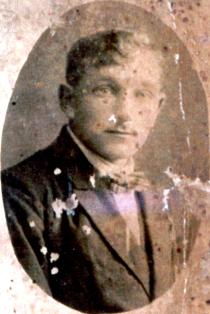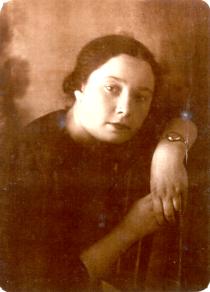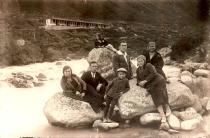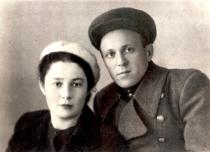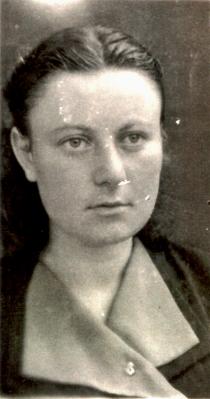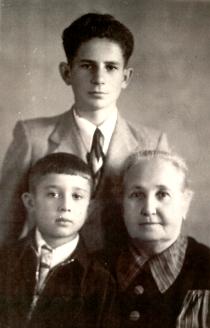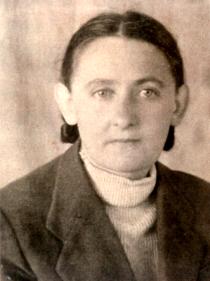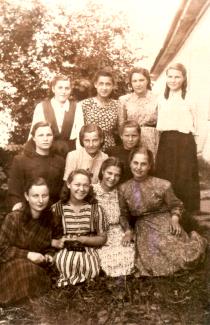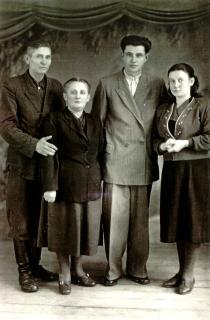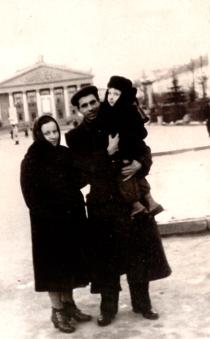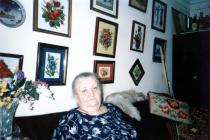This is my father Lazar Gitman and his sister Bella Geller. This photo was taken in Zhmerinka where Lazar and Bella were visiting their mother Riva Gitman in 1947.
My father Lazar Gitman was born in Litin in 1910. He finished cheder and after the revolution of 1917 he studied at a Ukrainian secondary school where he met my mother and they became friends. They spent vacations in a pioneer camp and took part in pioneer meetings. They joined Komsomol at school. After finishing school my father entered a Road Construction College in Vinnitsa. After finishing this college he returned to Litin and became a road engineer. My parents got married in 1933. My father loved my mother dearly, but he didn't have an opportunity to spend much time with her. I remember that he bought her a stay in a recreation center for a month. We missed her a lot. Our father worked for a road construction company. He went to work even if he felt ill.
In 1940 our father got a new job assignment and we moved to Vladimir-Volynskiy in 370 km from Zhmerinka. My father received a two-room apartment in a 2-storied house in early 1941. We moved there from one room that we had from the school where my mother worked. On 22 June 1941, when the Great Patriotic War began, our father was not at home, he went on a business trip. A day later fascists came to our yard.
In early 1942 the all Jews were taken to the ghetto. I have dim memories about our life in the ghetto. I remember the never-ending feeling of hunger and fear. Once a man wearing a policeman uniform approached us. He knew our mother. She was much loved and respected in the town. Our mother said 'Get me a Ukrainian passport and help us to get out of here, if you can'. A day later this policeman took us out on a horse-ridden cart. All I remember is that his name was Sergei. Sergei took us to a remote Ukrainian village and disappeared for good. Our mother took to any work she could lay her hands on: she learned to mow, thresh, weed the fields, milk cows and look after cattle when she had never done any farm work before. We never stayed long in one village. Our wandering lasted for about three years. Every now and then our rescuer Sergei visited us. He brought us gifts and had long discussions with our mother. I don't know what was between them or whether there was something else besides friendship and support. In spring 1944 I understood that mother was pregnant. My mother never revealed this secret. I didn't ask her and she didn't tell me anything even when she was dying. I don't know who was the father of her child. Mother took her secret with her. Vladimir-Volynskiy was liberated on 22 July 1944. We returned home in early August. In December 1944 our mother gave birth to a boy. She named him Grigori after our grandfather.
In July 1945 our father returned home. He and mother talked through the night. In the morning father had reddish eyes from sleepless night. He kissed us ‘good-bye’ and left. Our mother cried a lot. She told us that our father had another family. Our father told her what had happened to him through those years. He was in Zhmerinka when the war began. He went to look for us, but then there were Germans everywhere. Our father knew that Vladimir-Volynskiy was occupied and believed that were already dead. He even mentioned that he thought he saw our mother’s coat on a woman in Lutsk and this was a final proof for him that we were dead. He returned to Zhmerinka, got a truck and drove his parents and aunt Fania and her children to the railway station where they got on a train heading to the east. He also went with them. In the train he met a Jewish woman. Her name was Fira. He was suffering and he found consolation and sympathy with her. They parted on the next day. Our father took his relatives to Bugulma in Tatarstan. I don’t know for what reason they decided to stay there. Father was recruited to the army. He served in a road construction unit installing bridges for the front line units. Our father corresponded with this unit and knew that she gave birth to a girl in 1942. The girl was named Ella. Our father asked our mother to forgive him and tried to explain that what happened to him was a result of the pain he suffered from thinking that we were dead. He decided that he and mother had to forget what had happened to them and live together again, but our mother was a proud woman. She never forgave our father. She said she had suffered too much during occupation and couldn’t forgive his faithlessness. Our father went to Kiev where Fira and her daughter lived. He lived with his second family, but he didn’t lose hope to return our mother.
My father's younger sister Bertha married a Jewish man in the late 1930s and moved to Leningrad where her husband lived. In spring 1941 Bella came to Zhmerinka to have her baby. She was there, when the war began. She, grandfather and grandmother and Fania's family evacuated to Bugulma. Fania's son Michael was born there in 1941. Bella's husband perished at the front. In 1945 she married her husband's friend who was in love with her. They moved to Leningrad. Bella had her second husband's last name of Geller. In 1946 their son Yakov Geller was born.
Our father’s sister Bella returned from evacuation and visited us several times. Our father came again in 1947, but our mother refused him again. We have a photo of our father wearing a Soviet military uniform and aunt Bella in Zhmerinka photographed after our mother’s final refusal in June 1947. Our father signed the photo ‘This is the most terrible day in my life’.

